The Gospel of Jesus Christ

Today is the day of Salvation:
Why would anyone put off the most important decision they could ever make in their lives concerning eternal life? If you die today are you going to heaven?
1 Corinthians 15:1-4 – The apostle Paul tells us what the gospel is: “Moreover, brethren, I declare to you the gospel which I preached to you, which also you received and in which you stand, by which also you are saved, if you hold fast that word which I preached to you—unless you believed in vain. For I delivered to you first of all that which I also received: that Christ died for our sins according to the Scriptures, and that He was buried, and that He rose again the third day according to the Scriptures. Gospel means “good news.”
Your debt has been paid, the death penalty has been paid, you are free. Here’s the Gospel of Jesus Christ: That Christ died for our sins according to the Scriptures, and that He was buried, and that He rose again the third day according to the Scriptures. Jesus brought in a little child as a living object lesson to show who enters the kingdom of heaven.
Matthew 18:3 – Jesus said: “Unless you become like this little child you will not enter the kingdom of heaven.” This is how to be saved, it is simply child like, as simple as ABC:
A – Admit that you are a sinner.
This is where that godly sorrow leads to genuine repentance for sinning against a righteous God and there is a change of heart, we change our mind and God changes our hearts and regenerates us from the inside out. Romans 3:10 – As it is written: “There is none righteous, no, not one.” Romans 3:23 -For all have sinned and fall short of the glory of God. (We are all born sinners which is why we must be born spiritually in order to enter the Kingdom of Heaven). Romans 6:23 – For the wages of sin is death, but the gift of God is eternal life in Christ Jesus our Lord. The bad news is that the wages of sin is death, in other words our sin means that we have been given a death sentence, we have the death penalty hanging over our heads, that’s the bad news. But here’s the good news: The good news is that the gift of God is eternal life in Christ Jesus our Lord. Ephesians 2:8-9 – For it is by grace you have been saved, through faith —and this not from yourselves, it is the gift of God— not by works, so that no one can boast.
B – Believe in your heart that Jesus Christ died for your sins, was buried, and that God raised Jesus from the dead.
This is trusting with all of your heart that Jesus Christ is who he said he was. Romans 10:9-10 – That if you confess with your mouth, “Jesus is Lord,” and believe in your heart that God raised Him from the dead, you will be saved. For it is with your heart that you believe and are justified, and it is with your mouth that you confess and are saved.
C – Call upon the name of the Lord.
Every single person who ever lived since Adam will bend their knee and confess with their mouth that Jesus Christ is Lord, the Lord of lords and the King of kings. Romans 14:11 – For it is written: “As I live, says the Lord, Every knee shall bow to Me, And every tongue shall confess to God.”
Don’t wait until later — do this now. Romans 10:13 – For “whoever calls on the name of the Lord shall be saved.”
“O God, I am a sinner. I’m sorry for my sin. I want to turn from my sin. I believe Jesus Christ is Your Son; I believe that He died on the cross for my sin and that He was buried and You raised Him to life. I have decided to place my faith in Jesus Christ as my Savior, trusting only in His shed blood as sufficient to save my soul and to take me to heaven. Thank You, Lord Jesus, for saving me. Amen.”
The Gospel – the heart of the Christian message
The Good news is that God delights in you and that we were ‘created’ to live in joyful, loving fellowship with the Trinity.
Why did God make us?
Happy spontaneous love is never selfish! We believe that the love that the Father, the Son and the Holy Spirit have for each other is so deep and joyful that they constantly want to share it so that others can experience what they have.
So they made us. We are the expression of their love, created so that we could join in and experience the joy of that love. This is at the heart of the meaning of life – we were made for fellowship and to share in the inner life of the Trinity.
Free will – a blessing and a bane!
God’s desire was for us to receive and to respond to him in a relationship of mutual love but to do this He could not made us like robots, programmed love him and live in harmony with him. But programmed responses aren’t real. Pure real love has to be freely chosen, and so, in order for our response genuinely to the Trinity we were gifted with a blessing and a bane. They gave us the gift of choice – the gift of free will.
How did we use the gift of free will? You only need to look at the news channels to see what happens when we exercise free will and exclude God, putting ourselves in his place. Day to day we choose to love ourselves and hurt both God and others.
The full implications are not just cause and effect but something more dangerous.
Sin – free will gone bad
When we choose to sin we separate ourselves from the source of life. This damages our souls beyond repair. When St. Paul said that the wages of sin is death he wasn’t being melodramatic. Being cut off from the source of life damages our souls and there is no way we can fix them or scrape our way back up to God.
God’s rescue plan for us
John 3:16-17 New Revised Standard Version (NRSV)
16 “For God so loved the world that he gave his only Son, so that everyone who believes in him may not perish but may have eternal life.
17 “Indeed, God did not send the Son into the world to condemn the world, but in order that the world might be saved through him.
John reminds us the Trinity have never given up on us. Knowing that we could never restore things ourselves they set in motion a rescue plan of breath-taking proportions. Unfolded through the centuries from the book of Genesis, it reached its pivotal moment when God the Son came in person, and it continues even now as your read this.
The greatest miracle of all is that even after all the things we have done the Father, the Son and the Holy Spirit still love us and want to invite us back into the love and fellowship that we were originally created to enjoy in the beginning.
God the Son, ‘through whom all things were made’, came in person to rescue us. As John’s Gospel reminds us he is the Word who became incarnate as Jesus so as to offer us another chance to start gain and live in fellowship with the Trinity.
Why did Jesus come?
• To physically embody God’s love and concern.
• To explain about God and to clear up all the misunderstandings and strange ideas that people had acquired.
• To explain God’s way of seeing things and how to start living the way of heaven here on earth.
• To save us by not only becoming one of us but also by accepting the separation caused by our sins and by being crucified on our behalf. Only then could the source of life enter into death and from the inside destroy its stranglehold and power through the Easter resurrection.
• To invite us home
Jesus’s mission was to clear the way for us to return home. He invites us to be rescued and restored to the original love and fellowship we were made to share in — but of course the choice is ours.
Rescue – the Choice is yours
Jesus went through hell to rescue us. Because of his sacrificial death and Resurrection we now have a choice. Just as our free will got us into this mess so we have to use our free will to choose whether or not we want to be rescued and follow Christ … or equally to stay and live this life without him.
Free will is crucial to God’s plan, so for good or ill, God accepts the choice you make.
So who can be a Christian?
A Christian is someone who chooses to say ‘Yes’ to all that Jesus has done for us and ‘Yes’ to coming back into fellowship. Living in fellowship with the Trinity and with all the other people who have accepted the invitation is a crucial part of what it means to be a Christian. We all have the same heavenly Father so all Christians are related… we’re all ‘family.’
Jesus gives us the earthly church for strengthening, support and companionship on our journey. Some people try and wriggle out of it but being a Christian is about both believing and belonging. Whenever the New Testament talks about God’s people it uses words that emphasise belonging together – the vine, the flock, the household of faith, the body.
The Holy Spirit – the everyday companion
It’s the third member of the Trinity, the Holy Spirit, who connects us to all that Jesus has done through his cross and resurrection. The Holy Spirit comes to continue the work begun by Jesus. He empowers us, lives in us and he prompts and guides us, he is the one who reminds us of the teaching of Jesus and the one who as ‘Connector’ makes the sacraments (sacred moments and events) encounters and not just visual aids.
God hasn’t given up on you!
The Gospel- the Good News is that the Trinity hasn’t given up on us. The Good News is that they went to extremes to rescue us and invite us to come and share in the joy and delight that stands at the heart of their fellowship.
God’s invitation for everyone irrespective of the mess they’ve made of life!
It is a genuine invitation to start again – to have a new beginning or as it says in scripture – to be born a second time! All God asks is that you are genuine.
Those who say ‘yes’ are rescued, cleansed, forgiven and adopted into the family – the inner life of the Trinity!
How should we respond?
We don’t have to do things to gain God’s love. When we get things wrong he still loves us and when we get things right he delights in us! In his generosity he has already given us the invitation – all we have to do is to grow into a genuine response.
The goal of our lives now is quite simple
• To use everything God gives us to grow into oneness and fellowship with God.
• To gather with his people and help build up the life of His church.
• To let our lives and choices reflect our love and thanks and our desire to put Him first.
• To avoid everything that pulls us away from Him and his people.
• To work both with and alongside the Trinity as they refuse to give up on people and reach out to them with compassion and love.
Listening for God’s voice.
God is constantly communicating with each one of us, directly to our hearts and souls, through the words of the bible and through the conversation of those whose hearts are open. Listen out for what God is saying to yo. It’s up to you!
We passionately believe that God not only loves you but actually longs for you. That’s why he is constantly touching the edges of your consciousness. You are being invited to come home and reconnect with the purpose behind your existence.
All we have to do is to
• say a big ‘yes’ to all that Jesus has said and done – See the ABCs of Salvation
• a big ‘yes please’ to all that Jesus offers
• and a big ‘yes’ to living out the gospel in the real world with the rest of God’s family – the church
An added gift
When someone genuinely does this – God the Father is so overjoyed that we are honouring his Son that he adopts us and makes us part of His family. Jesus and the Holy Spirit share their love for God the Father with us and through them we have the privilege of knowing that we can access him at any time because he is now ‘Abba- Father’.
A Prayer that you can use …
Lord Jesus, you know who I am, you know me better than I know myself.
You understand that I long to find truth, that I long to be loved with a love that is unselfish and pure …
and yet I hold back – because I know myself to be a jumble of motives and moods.
Lord, you have never stopped loving me.
Forgive my mistakes and my sins, Wash me clean help me start again.
Thank you for loving me.
Come to me, and, in the security of your love,
help me recognise your prompting in my heart.
Amen
The Ministry of Prayer
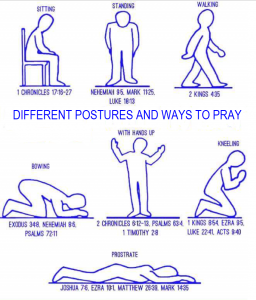 Prayer
Prayer
Praying for someone is one of the most powerful and caring things that one person can do for another. Why? Because when we pray we are using our free will to invite God into a situation.
God is always at work in the background but because our free will is such a key issue for him, he very rarely forces his way into things. Prayer is an invitation to God to come and work in a more direct way. That’s why when we pray things happen that otherwise would not happen.
You might be thinking … I’m not very good at praying!
If you can talk to your best friend then you have everything you need to pray!
St. Ignatius, the founder of the Jesuits, says that we should talk to Jesus as we would to a friend. Sometimes it helps to picture Jesus sitting in the chair opposite you or imagine him beside you as you walk and then talk slowly and openly – share concerns, ask questions, argue – talk naturally. Be authentic with Jesus … and remember to allow him to be authentic in return!
Sometimes I don’t feel like praying
That’s perfectly normal – join the club!
If you’re normal you’ll find that some days are easier than others. On Monday it may be an absolute pleasure to be in the warm presence of Jesus who loves and delights in you. By Thursday you may feel that prayer is simply another drain on your energy and that you’d rather avoid God and do something less costly.
There are lots of reasons why we can feel disinclined to pray …
• Sometimes the opposition may be trying to prevent you from praying.
• Sometimes we don’t want to pray because we are subconsciously hiding from God because we’re doing or have done something we know he doesn’t approve of.
• But most normally we often feel disinclined to pray because we’re physically or emotionally tired.
Our energy and our emotions fluctuate, but God still looks with joy and admiration when you make the effort – and on the grim days when you make the effort he knows it and you’ll probably find your prayers are much more powerful.
Sometimes it’s a struggle to pray
Getting to the point when you start praying and then concentrating whilst praying may sometimes be a battle. In those times put on the armour of God, be tough and persevere. If you loose concentration don’t let it worry you. It may actually be God prompting you to pray about whatever it is that’s come into your mind or it may be that you just have to accept that you have the attention span of a Goldfish. When you are tempted to give up remember that your fellow Christians are praying for you.
In the same way, on your good days return the favour and pray for those who are struggling with temptations and hurts.
Epaphras, who is one of you and a servant of Christ Jesus, sends greetings. He is always wrestling in prayer for you, that you may stand firm in all the will of God, mature and fully assured. (Colossians 4:12)
What happens if God doesn’t answer my prayers?
Prayer is not a magic wand that gets us what we want. It’s not a question of finding the right words or generating enough persuasive power through our feelings. We can debate and even argue with God but we still have to accept that he sees things from a higher perspective than us. That sometimes means that the timing or the outcome he has in mind may be different from the one we would prefer.
But, because we can’t second-guess what the outcome will be, St. Paul tell us to carry on persevering and opening the door to God. Even though God might not do things the way we were hoping for he will always respond to our invitation and be at work.
Yes, and I will continue to rejoice, for I know that through your prayers and the help given by the Spirit of Jesus Christ, what has happened to me will turn out for my deliverance. (Philippians 1:19)
Carrying people to God in prayer
Our prayers for other people will vary depending on their need. Sometimes our prayers are the natural outpouring of joy and love. For example, if we have family and friends it’s natural for us to express our love by asking God to bless and guide them.
At other times our prayers are an expression of our concern or anguish; perhaps someone we know is hurting and, knowing that we are helpless to change things. When that happens we do what the four men did with the paralysed man (Mark 2:3ff), we carry that person to Jesus in our prayers.
Prayer makes a difference – God always responds even if it isn’t in the way we expect, that why Paul exhorts us to …
Pray in the Spirit on all occasions with all kinds of prayers and requests. With this in mind, be alert and always keep on praying for all the saints. (Ephesians 6:18)
By inviting God into a situation things happen that wouldn’t otherwise occur. So prayer is one of the most loving and powerful thing you can do for someone.
Prayerfulness is also about living it …
Please try and live in a way that doesn’t spoil your friendship with Jesus, but don’t start worrying about our worthiness to approach God in prayer. If you slip, always remember that Jesus looks forward not backward. He has come to bring growth not guilt. So don’t be anxious. Rejoice in his patience and love and stand firm in your resolve to pray for others and then to carry them to God.
Do not be anxious about anything, but in everything, by prayer and petition, with thanksgiving, present your requests to God. (Philippians 4:6)
Finally remember three things …
• Firstly, God is looking forward to you talking to him.
• Secondly, when you pray there is always another Christian brother or sister somewhere in the world praying at the same time.
• Lastly, when you pray you are helping to keep the church spiritually healthy. Prayer is one of the key features of a healthy Christian and of a healthy church.
Let your love of God express itself through prayer.
They devoted themselves to the Apostles’ teaching and to the fellowship, to the Breaking of bread and to Prayer. (Acts 2:42)
Baptism – Joining the Church Family
 What’s it all about?
What’s it all about?
We are precious to God! He delights in us just as you do in your child! Before all things began he designed us to live in friendship with him. He also gave us the gift of freedom of choice.
We made a mess of things and we still do
Sadly, since the time of Adam and Eve we have misused our free will and made a mess of things. The good news is that God didn’t cast us off as we deserved.
John 3 verses 16 and 17 (HCSB) say:16 “For God loved the world in this way: He gave His One and Only Son, so that everyone who believes in Him will not perish but have eternal life. 17 For God did not send His Son into the world that He might condemn the world, but that the world might be saved through Him. Because of this great and deep love for us so much, he sent his Son Jesus to rescue us – to offer us a second chance and invite us back into friendship with him.
Jesus came to do six important things
He came:
• to express the love that God has for us
• to clear up misunderstandings about God
• to explain things, including how to live in fellowship with God
• to undo the effects of our sins by dying for us on the cross
• to undo the power of death by his resurrection
• to invite us to be rescued and to begin again in a new and personal friendship with God
– but the choice is ours.
A Christian is basically someone who says a personal ‘Yes’ to Jesus and to God’s invitation to come back into day-to-day fellowship with him.
So why get baptised?
Jesus himself was baptised to fulfil God’s requirements and set the standard for all believers. Baptism is the point where a person publicly declares that they want to leave their old way of life behind and begin a new life as one of God’s people becoming a Christian.
They are then immersed in water (or water is poured over them) as a sign of dying to their old life and of beginning again as one of our Lord’s people. In baptism we are immersed into Jesus and all he has done for us and we come out of the water to begin a new life in the family of his people.
Baptism has two sides to it
• There is the bit that God does
• and the bit that we do.
Both are necessary.
It begins with God. He reaches out to us to rescue us and invite us back into fellowship with himself. Our part is to accept the invitation. Becoming a Christian is all about
• saying a big ‘Yes’ to all that Jesus has said and done
• a big ‘Yes please’ to all that Jesus offers
• and a big ‘Yes’ to living out the gospel in the real world with the rest of God’s family – the church.
Our part of baptism is about believing and belonging.
An added gift from God
When someone genuinely believes – God is so overjoyed that He adopts us into His family. Before we were just beloved creations but through baptism, we become part of the family of God we have the status of being an adopted child.
Now along with all God’s other children – we have the privilege of calling God ‘Father’, hence the ‘Our Father Prayer’.
The baptism of babies
What about babies? Good question! A baby isn’t able to choose to become a follower of Jesus and for this reason some Christian Churches only baptise adults.
Our Church, the Church of England, says that it is happy to baptise babies on the understanding that the parents and Godparents will bring the child to church and do the human part of baptism with and for the child until such time as he or she can take over.
Your commitment
The church agrees to baptise infants because the parents and Godparents promise to bring the child up as a member of our church family and also to back this up at home by help him or her to pray and become a follower of Jesus. The promises made in the service are made to God and to the congregation.
Please only ask for baptism if you are genuine about doing this.
A bit heavy?
Yes, you’re right – but nothing of value is superficial.
Godparents
• For this reason, we would ask you to choose Godparents who have a real personal commitment to Jesus. They must have been baptised themselves and should be genuinely prepared to pray for and help their Godchild to be part of God’s family.
• Usually there are three Godparents, two of whom should be the same sex as the child and one of the opposite.
Our Church family
We would be overjoyed to welcome you into our congregation. We meet at 10am Sunday mornings and 7.15pm Wednesday evenings.
For all enquiries contact Revd Unesu on 07534580578.
Confirmation
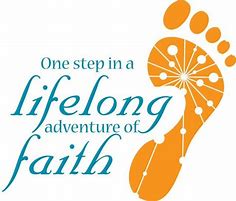 What is Confirmation?
What is Confirmation?
For us confirmation is the second and completing part of baptism. It is our chance to say our own personal Yes to what was said on our behalf when we were baptised. Because of that conscious act of openness it is also the point where the Holy Spirit deepens his work within us.
In the early church
If you read the Gospel accounts of the baptism of Jesus you’ll see that this special event had two parts to it, the first was his immersion in water and the second was the descent of the Holy Spirit. In the same way baptism in the early church mirrored this with baptism in water being followed by the laying on of hands with prayer for the anointing of the Holy Spirit. So normal was this that the Acts of the Apostles goes out of its way to mention that when the two got separated the Apostles Peter and John made a special journey to provide part two. (Acts 8.14-17)
In later years because Christian parents naturally wanted their children baptised the Western church decided to separate the two parts of the service. Babies were ‘baptised’ on the understanding that the parents (and sponsors) would nurture their child as a follower of Jesus. The Laying on of hands part of the service – the ‘Confirmation’ part was then kept till those concerned had grown up and could make their own public declaration that they genuinely wanted to follow Jesus and belong to his people.
The service
Confirmation is not only the opportunity for a person to publicly affirm his or her own personal Yes to Jesus and Yes to belonging, it’s also a time when God responds and does something special. He confirms his willingness to save, adopt and strengthen that person. In addition, because that person consciously chooses to make that act of openness to him, the Holy Spirit is able to deepen his activity within and work towards not just an increase in inner communion but also a gifting for personal spiritual growth and the growth of the church.
In confirmation we make a choice to believe and belong and God responds and begins a new level of work with us and within us.
Who can be confirmed?
Anyone who has been baptised! Having said that, because there is always a short course of learning and preparation leading up to Confirmation it is normal for people to be at least 10 and preferably older before they come to confirmation.
What happens if I’m older?
There is no upper age limit for confirmation. One of the really exciting things to witness is that the number of adults coming for confirmation is steadily increasing. It is such a tremendous witness to see people coming to faith in later life – and it is truly wonderful to see teenagers, parents and grandparents being confirmed alongside each other!
Anyone who has been baptised and who is genuinely trying to love and live for Jesus and who embodies that in worship with his people is welcome to be confirmed.
*This page gives an outline of what happens in a Eucharistic Service, and later a brief introduction to what the Eucharist means.
What Happens in a Eucharist Service?
Part I
Preparing ourselves for worship
First we pray for help

We begin by dedicating ourselves and our worship.(You may see some people making the sign of the cross on ourselves).
Then we ask God to send the Holy Spirit to inspire us and help us to worship.
Then we confess our sins
- We say sorry for the times we have sinned by breaking one of God’s commandments, or by hurting others or ourselves by what we’ve done or failed to do.
Sin stunts our spiritual growth and spoils our friendship with God so it’s important to deal with this right at the beginning.
We receive absolution
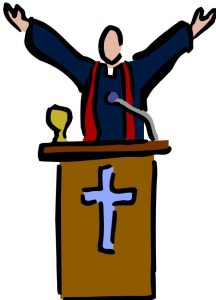
As ambassador, the priest declares God’s gift of forgiveness
(see John 20.22-23)
We sing or say the Gloria
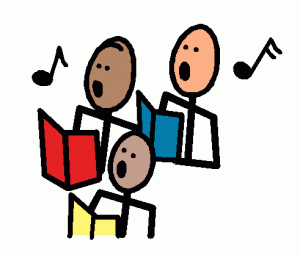 We use a modern setting of a very ancient song called the ‘Gloria’ (Glory to God) as a response and a sign of our joy at being forgiven.
We use a modern setting of a very ancient song called the ‘Gloria’ (Glory to God) as a response and a sign of our joy at being forgiven.
The Collect

The Collect is the term for the special prayer that introduces the theme of the day or the Service. This prayer is normally printed out for you on the front of the weekly pew leaflet.
Part II
Receiving God’s message – the time of learning
The Bible reading
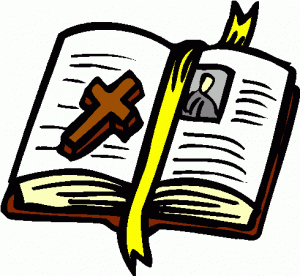 We listen to what God wants to say to us through the bible readings and the sermon that follows.
We listen to what God wants to say to us through the bible readings and the sermon that follows.
In our services we usually have three readings; an Old testament reading, (followed by a psalm) a reading from Acts or one of the New Testament letters and finally, after a short hymn, a reading from one of the Gospels. Because the Gospel reading contains the words of Jesus we give it a special honour. We remain standing and wherever we are in the church we turn to face the book of the Gospels as we listen to the things Jesus said and did.
Then the Sermon
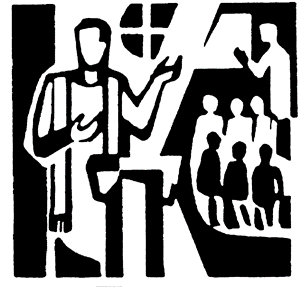 With our hearts open we listen and trust God will speak to us, teach us something new or remind us of something important.
With our hearts open we listen and trust God will speak to us, teach us something new or remind us of something important.
As disciples it is our job to listen and then put it into practice.
After taking in the things that God wants to say to us we respond to Him by
Saying our Creed
- We reaffirm our faith by using the words of The Creed “We believe…”
Then by praying
- We talk to God directly. We pray for the world and for other people. This type of prayer is called ‘intercession’.
We share the Peace
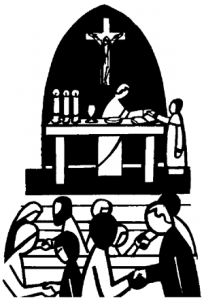
We shake hands or embrace in order to make our peace with each other and to ask God to give his peace to the person we are talking to.
We do this because Jesus told us to make peace with each other before we come to the Altar.
Part III
The Eucharistic prayer – remembering and welcoming
Eucharistic Prayer
- We sing the offertory hymn during which the collection is taken.
- At the same time the gifts of bread and wine are brought to the front.
- The next part of the service is the most holy and special. The priest stands at the altar and on behalf of us all prays one of the Eucharistic prayers.
 All of them start by thanking God for making us and for sending Jesus to rescue us. Then after we have all joined in the Sanctus (Holy, Holy, Holy) the Eucharistic prayer continues by recalling the things that Jesus said and did at the last Supper, how Jesus took the bread and wine and said that through them we would share in his offering of his body and blood.
All of them start by thanking God for making us and for sending Jesus to rescue us. Then after we have all joined in the Sanctus (Holy, Holy, Holy) the Eucharistic prayer continues by recalling the things that Jesus said and did at the last Supper, how Jesus took the bread and wine and said that through them we would share in his offering of his body and blood.
We believe that through the power of the Holy Spirit the bread and wine are like doorways through which Jesus, our risen Lord, comes to us. He allows himself to be somehow present in and through them and this gives us a chance to welcome him, genuflect, kneel and bow down in his presence.
The Lord’s Prayer
- This prayer is special because it was given to us by Jesus. Each line is a prayer in it’s own right, but taken together they become a prayer that echoes the mind and voice of Jesus. There is an intimacy in the opening words. Through the indwelling of the Holy Spirit, and having been adopted into God’s family, we also can pray ‘Abba – Father’.
The bread is broken
- This reminds us of Jesus being broken for us on the cross.
The Invitation
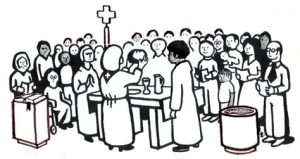 The priest invites the people to the table to share in the meal.
The priest invites the people to the table to share in the meal.
Everyone who is confirmed or who normally receives communion in their own church is invited to share with us. Those who haven’t yet made that commitment to Jesus are invited to come and receive a blessing.
Receiving communion is our chance to be reconnected to all that Jesus has done for us through his death and resurrection. By receiving the bread and wine we once again consciously invite Jesus into our lives.
When we’ve been blessed or received communion we return to our places and keep respectful silence or join in the hymn that is being sung until everyone has received and the service resumes.
Part IV
Giving thanks and being sent out to live the Gospel
Post Communion prayer
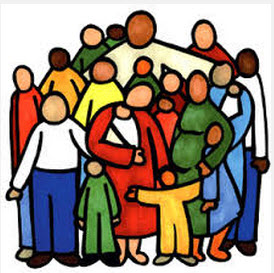
We say thank you to God for meeting with us and allowing us to receive the grace he gives us through the bread and wine.
In return we offer him our souls and bodies to do his work here on earth.
The Blessing
- Then the priest blesses the people in God’s name and sends them out to serve God by living the Gospel in their everyday lives.
The main Sunday service usually ends with a hymn. - Then we have tea and coffee and a chance to chat and catch up on news!
An Introduction to the Eucharist
No one will ever be able to explain or even adequately introduce the Holy Eucharist.
Quite simply it is too deep, too profound and too awesome a mystery to be expressed in human words.
You may also encounter it being called ‘The Lord’s Table’, Holy Communion, Mass, the Lord’s Supper or The Breaking of Bread. They are all names for the same sacramental act commemorating the death of Christ and remembering his resurrection.
The actual word, Eucharist means “thanksgiving.”
So we can say Eucharist is a place of meeting and communing with Jesus. For us the bread and wine are channels of his presence and his grace.
Just as in the incarnation, when God the Son stepped inside created things to rescue and redeem us, so now in some way beyond all human words and understanding, the same Lord of incarnation meets with us through bread and wine. Through them we are somehow united to him and share in the benefits of his sacrifice.
The Eucharist is not just a reminder or a celebration of a past event. Jesus is very much alive. The experience of the disciples at Emmaus (Luke 24:35) was that the breaking of bread was the point when they recognized that it was the risen Christ who was with them. Why is that so significant? Because the phrase ‘the breaking of bread’ is Luke’s term for the Eucharist. Luke is telling us that the Mass/Holy Communion is a place of encounter with the risen Lord Jesus.
As we gather round the altar we have a chance to hold out our empty hands as symbols of our longing and then both welcome and invite Jesus into our hearts and lives as he comes to us through bread and wine. To him be glory for ever. Amen.
Bible insights into the meaning of the Eucharist
A new covenant meal and a sacrament of forgiveness
Jesus took bread, gave thanks and broke it, and gave it to his disciples, saying, “Take and eat; this is my body.” Then he took the cup, gave thanks and offered it to them, saying, “Drink from it, all of you. This is my blood of the covenant, which is poured out for many for the forgiveness of sins.” (Matthew 26:26ff)
The Eucharist unites us to the sacrifice of Jesus
Is not the cup of blessing which we bless a participation in the blood of Christ? And is not the bread that we break a participation in the body of Christ? (1 Corinthians 10:16)
Jesus said to them, “I tell you the truth, unless you eat the flesh of the Son of Man and drink his blood, you have no life in you. Whoever eats my flesh and drinks my blood has eternal life, and I will raise him up at the last day. For my flesh is real food and my blood is real drink. Whoever eats my flesh and drinks my blood remains in me, and I in him.” (John 6:53ff)
An encounter with the risen Lord (the breaking of bread is Luke’s term for the Eucharist)
Then the two told … how Jesus was recognized by them ‘in the breaking of bread’ (Luke 24:35)
The Eucharist is the sacrament of unity and community
Because there is one bread, we, who are many, are one body, for we all partake of the one bread. (1 Corinthians 10:17)
The Eucharist is the new Manna for the journey
I am the bread of life. Your forefathers ate the manna in the desert, yet they died. But here is the bread that comes down from heaven, which a man may eat and not die. I am the living bread that came down from heaven. If anyone eats of this bread, he will live forever. This bread is my flesh, which I will give for the life of the world. (John 6:48)
The focus of the earliest Christians
They devoted themselves to the apostles’ teaching and to the fellowship, to the breaking of bread and to prayer. (Acts 2:42)
Information will appear here soon.
The Church’s year
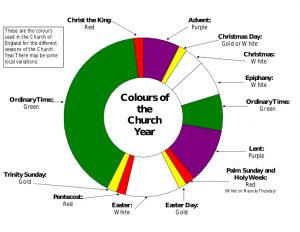
The chart above shows the flow of liturgical seasons and the colour used to help symbolise and differentiate them. The chart below borrowed from the Catholic church helps to explain the meanings behind the most commonly used liturgical colours, used to decorate the altar, Lectern and as worn by priests wearing stoles and chasubles
.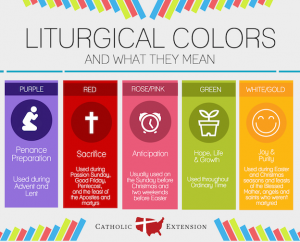
When does the Church’s year begin?
The Church’s year begins almost a month earlier than Jesus’s big day. as the birth of Jesus’s birth was preceded by centuries of preparation work done by God leading up to the point where Jesus came in person. So the church’s year reflects this and begins not at Christmas but with a short season of preparation leading up to Christmas called ‘Advent’ and it begins on Advent Sunday.
The Season of Advent
Advent Sunday is normally either the last Sunday in November or the first Sunday of December. The word ‘Advent’ is from a Latin word that means:
‘Movement towards something’
‘Something that’s on it’s way’
‘Something that is about to arrive’
Advent has a dual theme. It reminds us that there are two things on the way namely, the first and the second coming of Jesus. Advent is a time when we celebrate the first coming of Jesus –which we celebrate at Christmas. It’s also the time when we think about the Second coming of Jesus when he comes again in glory on the Last Day.
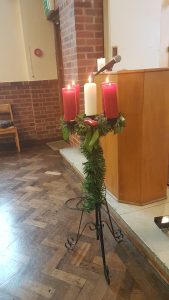 Because Advent is a season of preparation (and penitence) the colour of Altar cloths and Clergy vestments is purple.
Because Advent is a season of preparation (and penitence) the colour of Altar cloths and Clergy vestments is purple.
As we go through the Sundays of Advent the focus increasingly turns towards the celebration of Christmas. It is the custom of many Anglican churches to use an Advent candle wreath to mark out the journey through Advent. Each Sunday another of the Candles is lit until finally at Christmas Midnight mass the white candle in the middle is lit to announce the birth of Jesus.
Each candle representing those looking forward to the coming of Christ: the hope of all God’s people
• The Patriarchs (week one),
• The Old Testament prophets (week two),
• John the Baptist (week three) and
• Mary the mother of Jesus (week four).
• The 5th is for Christ the Light of the world coming to us all
Christmas
At Christmas we celebrate the fact that God came in person to rescue us! His willingness to help, his vulnerability and the type of people he entrusted himself to all tell us important things about his values and priorities.
 Christmas begins after dark on Christmas Eve. We’re used to the idea of days ending and beginning at midnight but there are a number of instances where the church follows the more ancient Jewish practice where days begin and end at sunset. The hours after sunset are the beginning of the new day – they are the vigil or the ‘Eve’ of the new day!
Christmas begins after dark on Christmas Eve. We’re used to the idea of days ending and beginning at midnight but there are a number of instances where the church follows the more ancient Jewish practice where days begin and end at sunset. The hours after sunset are the beginning of the new day – they are the vigil or the ‘Eve’ of the new day!
Many Anglican churches hold candlelit services during Christmas Eve and in most Churches there will be a Christmas crib – a visual reminder of the first Christmas in the form of a manger and small statues of Mary, Joseph, the shepherds and probably some animals as well. The ‘invention’ of the Christmas crib’ is usually ascribed to St Francis of Assisi who wanted to provide people with a visual aid that would help them to really engage with the amazing things that we celebrate at this time. The statue of baby Jesus is normally placed in the crib just before the Eucharistic prayer at Midnight mass.
Christmas is a celebration of Jesus’ life – so the colour of the Altar frontal and clergy vestments is white or gold.
Epiphany
The Feast of the Epiphany (which takes place immediately after the 12 days of Christmas) is the day when we celebrate the arrival of the magi or ‘wise men’.
Despite all the Christmas cards and some carols) the Wise Men didn’t arrive at the birth of Jesus. If you read Matthew chapter 2 verse16 the Wise Men may have arrived some time after the first ‘Christmas’. By the time of their arrival Jesus is no longer a baby but a child and by this time the family have established themselves in (or have built) a house (Matt 2:11).
In some churches the crib scene remains but the statues of the shepherds will have been removed and during the service they are replaced by statues of the wise men.
Epiphany is a celebration of Jesus’ life – so the colour of the Altar frontal and clergy vestments is white or gold.
The Season of Epiphany
The feast of the Epiphany is the beginning of a 40-day ‘Season of Epiphany’. This is a time when our Sunday Gospel readings seem to make Jesus grow up remarkably quickly only to return him to being a child again at the end of the season. The reason for this strange feature is found in the term ‘Epiphany’ which is a Greek word which means ‘something that is shown or ‘revealed’ to you.’ The Sunday Gospel readings are all about Jesus’ person, mission or power being pointed out or revealed in instances such as his baptism and first miracle at the wedding at Cana.
Candlemas
40 days after Christmas the season of Epiphany comes to an end with a special festival called The Presentation of Christ in the Temple also affectionately known as Candlemas.
Forty days after a birth Jewish family would have a special service to give thanks for the birth of the child and to mark the purification and return of the mother into outside society.
Because they are still living close by Mary and Joseph take Jesus to the Temple in Jerusalem where they are met by two special people, Anna and Simeon who recognise that Jesus will be the Messiah who give light to both Jews and non-Jews alike.
This theme of light is reflected at the end of the service when the congregation carrying candles all process to the font or main door saying or singing a musical setting of the words that Simeon said as he blessed Jesus.
Ordinary time
There are two section of ordinary time in the church’s year; this is the first section and we sometimes refer to it as the “Sundays before Lent” Ordinary time is when we aren’t in any other season and in our Sunday Gospel readings, we begin to read our way through either Matthew, Mark or Luke depending on whether we are in Year A, B or C. Using the ABC cycle the Anglican church reads through the bible every 3 years.
The Season of Lent
The gospels tell us that for 40 days Jesus fasted and prayed in preparation for his ministry. Lent originally mirrored this by being a special time when adult candidates fasted and prayed and were instructed in preparation for their baptism on Easter Eve.
As time went by more and more people began to use this time as a way of joining Jesus in facing our temptations, reviewing our spiritual health and preparing ourselves spiritually for Holy week and Easter. Lent begins on Ash Wednesday.
Ash Wednesday
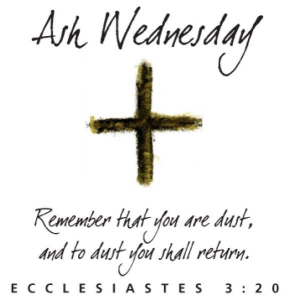 The Church holds a special Eucharist in which we have a chance to say sorry to God and dedicate ourselves to keep a holy Lent. In the Old Testament the Jews put ash on their head as a sign of true sorrow and repentance; we use that same symbol in a slightly modified. We show that we are serious about repentance by making a journey to the Altar to be ‘ashed.’
The Church holds a special Eucharist in which we have a chance to say sorry to God and dedicate ourselves to keep a holy Lent. In the Old Testament the Jews put ash on their head as a sign of true sorrow and repentance; we use that same symbol in a slightly modified. We show that we are serious about repentance by making a journey to the Altar to be ‘ashed.’
In response the priest places the ash on our foreheads in the shape of the cross – the sign and symbol of forgiveness. The ash is made by burning the palm crosses of the previous year.
Lent lasts 40 days – from Ash Wednesday till sunset on Easter Eve. (You don’t count the Sundays)
Because it is a time of penitence and preparation the church’s colour is purple.
Holy Week – Palm Sunday
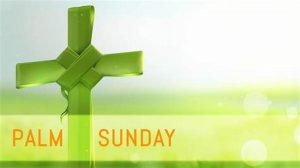 The Last week of Lent is also known as Holy Week – the most holy week in the Christian year. It begins with Palm Sunday when we remember the day when Jesus entered Jerusalem riding on a donkey and how the crowds welcomed him by shouting singing and waving branches from palm trees. We also remember how quickly the crowds began to turn on him when it dawns on them that he had not intentions of being a political or warlord messiah.
The Last week of Lent is also known as Holy Week – the most holy week in the Christian year. It begins with Palm Sunday when we remember the day when Jesus entered Jerusalem riding on a donkey and how the crowds welcomed him by shouting singing and waving branches from palm trees. We also remember how quickly the crowds began to turn on him when it dawns on them that he had not intentions of being a political or warlord messiah.
On Palm Sunday the main service has two parts. Some churches begin in a place other than the main church building. After hearing the Palm Gospel palms crosses are carried as believers journey to the church and in so doing accompany Jesus on his journey to the Temple. On arrival at the Church the theme of the service changes very dramatically as the ‘Passion Gospel’, the Gospel account of Jesus’ trial and his suffering on the cross are read. The word ’passion’ in this context means suffering – or ‘something that is done to you.’
Monday to Wednesday of Holy Week
After his dramatic arrival Jesus simply spends the next few days healing people and teaching in the temple. Every evening he travels out to Bethany the home of Mary, Martha and Lazarus. Wednesday is traditional known as ‘Spy Wednesday’ the day when we remember Judas making the deal to betray Jesus.
Sunset on Thursday to Sunset on Sunday
The most special part of Holy Week runs from sunset on Maundy Thursday to sunset on Easter Sunday. This is often referred to as the Easter Triduum or the Three days. To understand the background and to understand why we say that Jesus rose on ‘the third day’ it’s important to know somethings about the Jewish day.
We think of the day beginning and ending at Midnight but the Jewish belief and therefore in the biblical way of thinking was that a day ends when the sun has gone down. So one day ends and the next begins at Sunset.
So in the Jewish/ biblical way of thinking the time between the Last Supper on Thursday Night till the night of Easter Sunday looks like this.
1st Day 2nd Day 3rd Day
So many things happen on the first of the sunset to sunset days – Jesus has the Last Super, he is arrested, tried, crucified and buried. On the second day (Friday sunset to Saturday sunset) nothing visible happens but then on the third day, which begins at sunset on Saturday, something happened that changed everything. The resurrection took place at some point during the hours of darkness.
Thursday of Holy Week (Maundy Thursday)
After sunset on ‘Maundy Thursday’ Christians commemorate the events that took place when Jesus and his disciples had the Last Supper in an upper room in a house in Jerusalem.
As none of the disciples are willing to acknowledge that they are the ‘least’ in status in the group none of the group are willing to wash the feet of the others when they arrive for the meal, so Jesus himself gets up and washes the feet of his disciples. Having done this he did a profoundly significant thing he added to the ten commandments by giving them a ‘new commandment’ – that you love one another as I have loved you.” In Latin the word for commandment is mandatum which, in English, eventually got shortened in Maundy – hence Maundy Thursday.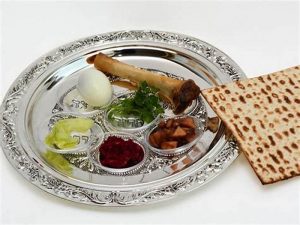
However even more significant that giving us a new commandment was what took place during the actual meal part of the Last Supper. The reason for the gathering was to hold a meal to celebrate the Jewish Passover. At its heart the highly ritualised Passover meal with symbolic food both recalls and celebrates the way God sent Moses to rescue the Jews from slavery in Egypt and lead them to freedom in the Exodus to the promised land. During the course of the meal Jesus adds a new chapter – Jesus has been sent to rescue us from a different kind of slavery and to lead us on a different kind of exodus to a new home. He takes bread and wine and gives them to us as a way of not just remembering but also participating in his sacrificial death and resurrection.
Much later, probably around midnight Judas leaves and, after singing the Passover hymn, Jesus goes to pray in the quiet and secluded garden of Gethsemane. While here Jesus experiences the extreme stress and anguish of knowing what will happen to him in the morning. While he is still there Judas arrives and identifies Jesus to Temple guard whom promptly arrest him.
In Church our Maundy Thursday Eucharist reflects these three big events.
 After the Readings and sermon the priest washes the feet of members of the congregation to remind all of us of the new commandment and how we are all called to be the servants of others. Then the focus changes and we remember and celebrate the Eucharistic sacrament that Jesus gave us in the Last Supper. Finally in order to remember the agony of Jesus in the garden and the way that everything – including freedom, his dignity and even his clothes were stripped from him we mirror this by stripping the altars and removing all banners, colour and moveable objects from the church leaving bare and desolate for Good Friday.
After the Readings and sermon the priest washes the feet of members of the congregation to remind all of us of the new commandment and how we are all called to be the servants of others. Then the focus changes and we remember and celebrate the Eucharistic sacrament that Jesus gave us in the Last Supper. Finally in order to remember the agony of Jesus in the garden and the way that everything – including freedom, his dignity and even his clothes were stripped from him we mirror this by stripping the altars and removing all banners, colour and moveable objects from the church leaving bare and desolate for Good Friday.
In many churches there is a vigil or a watch from the end of the service until late on – to recall the time Jesus spent in Gethsemane.
Good Friday
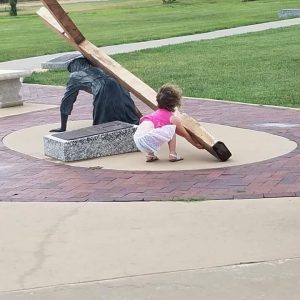 Although a separate day for us, in the biblical reckoning this is still the first day. (see above) During the early hours of Friday morning Jesus was ‘tried’ and condemned by the High priests and the Sanhedrin.
Although a separate day for us, in the biblical reckoning this is still the first day. (see above) During the early hours of Friday morning Jesus was ‘tried’ and condemned by the High priests and the Sanhedrin.
Not long after dawn he was taken to Pilate and there was a second and more official trial that took place while the city was still fairly sleepy. Pilate eventually gave in to the demands of the Jewish Sanhedrin and so Jesus was scourged and led off to be crucified.
It is the custom for many local churches of different denominations to come together and take part in a Walk of Witness through their town in the morning of Good Friday prior to holding services in their own churches for the last hour of Jesus’ life.
Jesus was put on cross at 9 am and he died at 3pm. (Mark.15v25 &33). He was then put in into the tomb before the first day ends and the Sabbath began (sunset).
Easter Eve (Saturday daytime)
Nothing visible happens on the second day (Friday Sunset to Saturday Sunset) this is the second day that Jesus body has been dead and in the tomb.
Easter Eve (night-time)/ Resurrection Sunday
The Third day begins at Sunset and at some point during the night the resurrection took place. The only thing we know for certain is that Jesus rose before dawn on the third day. By first thing in the morning “ while it was still dark” (John 20.1) the resurrection had already taken place. For this reason the first big celebration of the resurrection takes place at some point after sunset on Saturday night. 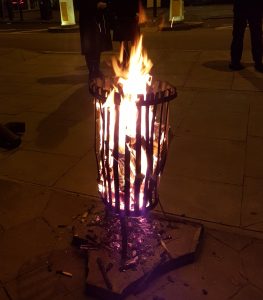
The service follows quite an ancient format. We begin in semi darkness in the church where we keep a short vigil of readings, short prayer and songs as we recall the way God’s saving plan has unfolded. Then we go outside the church to a place where a bonfire or smaller and more contained fire is burning. The bonfire represents the fire of the Holy Spirit through whose power Christ was raised from the dead. A flame is taken from the bonfire and used to light the big Paschal candle – which represent Jesus.
The Paschal candle is then carried back into church and as everyone follows and comes back into Church the small candles they carry are lit so the light of the resurrection touches their lives and spreads out through the whole building. After the Paschal candles has been carried to the front of the Church a setting of the exsultet is sung and the church bursts into praise as we sing the Gloria and bells are rung and we celebrate the first mass of the risen Christ.
Easter Day is more of the same only quieter!!!
The Season of Easter
Jesus continued to come and go for the next 40 days and this is reflected in the church having a season of Easter in which we read the accounts of the post resurrection encounters Jesus had with a variety of people. (Including on one occasion 500 people (see verse six of 1 Corinthians chapter 15.)
Ascension Day
This is the day when we celebrate the end of Jesus’ mission here and his return to the Father. The disciples are obviously concerned and full of self-doubt at the fact that they will now have to manage without the bodily presence of Jesus to support and encourage them but it was vital for Jesus to return to the Father and be de-restricted physically for the next stage of the plan to begin. Before he goes Jesus has promised the disciples that he would send someone (the Holy Spirit- the third member of the Trinity) who would take over, empower them and stay with them forever. From a different perspective the Ascension is the day when all of heaven turns out to celebrate and welcome the conquering hero home.
Pentecost
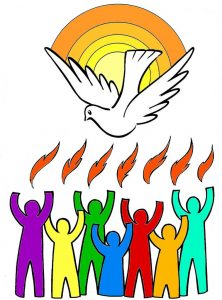 As the name suggests Pentecost takes place fifty days after our Easter celebrations and is the day when we remember the arrival of the next member of the team who takes over where Jesus leaves off. In Acts chapter 2 we are told that all the core group (the Disciples together with many of the others including Mary – see Acts 1.14) were gathered together they were surrounded by two signs – breath or wind and fire two signs of the Holy Spirit that announce his arrival. Those present are then filled with the Spirit and are filled with new boldness and the abilities. It is the Holy Spirit who is our guide our teacher and our advocate.
As the name suggests Pentecost takes place fifty days after our Easter celebrations and is the day when we remember the arrival of the next member of the team who takes over where Jesus leaves off. In Acts chapter 2 we are told that all the core group (the Disciples together with many of the others including Mary – see Acts 1.14) were gathered together they were surrounded by two signs – breath or wind and fire two signs of the Holy Spirit that announce his arrival. Those present are then filled with the Spirit and are filled with new boldness and the abilities. It is the Holy Spirit who is our guide our teacher and our advocate.
There is no particular ceremony attached to Pentecost Sunday, though in some churches the congregation come to the altar and are anointed with the Holy oil of Chrism.
Ordinary Time
There are two periods of Ordinary time in the Church’s year, the short one begins after Candlemas and the very long one that begins the day after Pentecost. It may seem strange to go into ordinary time and then celebrate Trinity Sunday, a bit
During Ordinary time we settle down and Sunday by Sunday we read our way through one of Gospels.
• Year A we read St Matthew,
• Year B – St Mark
• in Year C – St Luke.
• We read bits of John during Festival times.
Having said all this we frequently interrupt the cycle of readings to celebrate special Holy Days and Saints days. The following are just a few of the major Holy Days.
Trinity Sunday
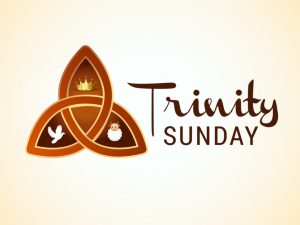 The Sunday after the arrival of the Holy Spirit at Pentecost we celebrate Trinity Sunday. The reason is obvious. As God’s plan had been gradually unfolding we have been getting more and more insights – glimpses into the mystery of what God is really like.
The Sunday after the arrival of the Holy Spirit at Pentecost we celebrate Trinity Sunday. The reason is obvious. As God’s plan had been gradually unfolding we have been getting more and more insights – glimpses into the mystery of what God is really like.
We were told right from the very beginning that there is only one God but we had made the assumption that God is exactly like us – one ‘body’ or substance with one ‘person’ or centre of consciousness.
But with the arrival of Jesus we realised that he too was some how part of God although separate from the Father. Then with the arrival of the Holy Spirit – clearly not a force or a power as had been thought in the Old testament but a separate person who had come to continue and connect us to the work begun by Jesus, we had to stop and rethink our view of God again. God is somehow one substance with three distinct centres of consciousness – three person – we haven’t clue how that works. But the really important thing to remember is that no one in their right mind would have invented such a confusing and vote loosing idea. It’s just how it is! God is one and yet somehow also a community – perhaps that’s why belonging and groups and community are so important.
Corpus Christi
Corpus Christi are the Latin words for ‘the Body of Christ’ and as the name suggests the feast is the day when we give thanks and reflect on all that God gives us in the gift of Holy Communion.
On either the Thursday or increasingly the Sunday after Trinity Sunday the more catholic (Roman and Anglo-catholic) parts of the Western Church celebrate a special Holy Day called Corpus Christi.
Some churches have a procession within the service. The Host (the big altar bread) is placed in a special glass fronted frame called a monstrance so that people can be blessed by the presence of Jesus in the bread which is then carried in a procession around church or when practical in a procession from church to a special altar set up in a nearby garden.
Major Saints’ days
Most churches will hold a Eucharist on the days associated with the Apostles and major Saints. They will also hold a Eucharist on the day associated with the Saint who is the patron of their church. (The saint to whom the church has been dedicated e.g. St. Andrew’s Church) That day is known as that church’s ‘Patronal festival’.
All Saints Day
All Saints Day is the day when we remember both the big and famous and also all those countless thousands of saints who will be honoured in heaven but whose names we will never know. There are two very good reasons for celebrating the saints.
• The first is that their life stories are like mini ‘Acts of the Apostles’ they continue the never-ending story of God’s involvement in the world – which means that we can learn more about God through them.
• The second is that the saints were (and still are) extremely ordinary and fallible people like us but when they opened their lives to Jesus he gave them the strength or the grace to do things they would never have thought possible. The Saints are examples for us – they are the proof that it is possible to live, work and witness for Jesus in both ordinary and difficult situations. In a sense they are role models who show us that it is possible to live heroically for Jesus.
All Souls’ Day
We don’t stop caring for someone just because his or her physical body has died. As Christians know that death is not the end, the resurrection of Jesus proves that there is life after death. Nor are the dead simply unconscious or in cold storage until the last day. At the crucifixion Jesus promises the repentant thief ‘today you will be with me in paradise.’ Paradise is presumably the place where we await the final day. The New Testament talks of the departed as being like a cloud of witness (supporters who cheer us on) it also gives us glimpses that like Moses and Elijah at the transfiguration of Jesus they know not just the present but have insights into the future.
With this mystery in mind we have a special Eucharist on All Souls’ Day when we give thanks for the lives of departed family and friends and those who have been significant in our lives, and ask our Heavenly Father to continue to look on them with his wisdom, his mercy and his love.
The Feast of Christ the King
This feast is held on the last Sunday of Ordinary time – the Sunday before Advent and as such it is the last Holy Day of the Church’s year (unless the Church is named after St Andrew whose day is 30th Nov) On Christ the King we think about the way Jesus showed his true majesty when he sacrificed himself for his people on the cross. We give thanks for resurrection, for the Father giving him the name above all names and for the fact that he is now the King of kings who not only loves us but who also delights in us.
Tab Content










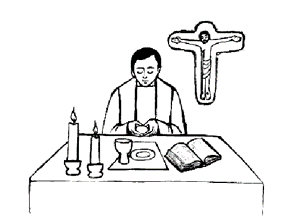 All of them start by thanking God for making us and for sending Jesus to rescue us. Then after we have all joined in
All of them start by thanking God for making us and for sending Jesus to rescue us. Then after we have all joined in